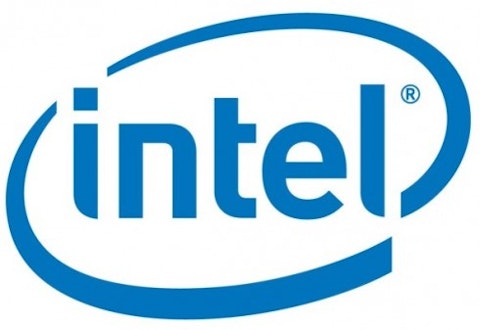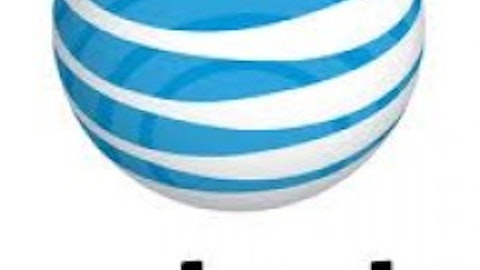Dividend stocks outperform non-dividend-paying stocks over the long run. It happens in good markets and bad, and the benefit of dividends can be quite striking: Dividend payments have made up about 40% of the market’s average annual return from 1936 to the present day. But few of us can invest in every single dividend-paying stock on the market, and even if we could, we might find better gains by being selective. That’s why we’ll be pitting two of the Dow Jones Industrial Average‘s dividend payers against each other today to find out which Dow stock is the true dividend champion. Let’s take a closer look at our two contenders now.
Tale of the tape
Intel Corporation (NASDAQ:INTC) is nearing the 14th anniversary of its initiation to the Dow. It joined at the peak of the dot-com bubble and has yet to provide a net benefit to the Dow’s valuation, but unless you bought Intel stock at the tail end of 1999, this isn’t much of a concern to you. Intel has long been the world’s leading chip-maker, with a dominant position in both PCs and servers — but declines in PC sales have left investors somewhat worried that Intel Corporation (NASDAQ:INTC)’s growth days are behind it. Despite these concerns, Intel continues to support one of the strongest dividends in the tech industry. Its tablet market share is growing rapidly, for what it’s worth, as Intel has a spot in 90% of Windows-based tablets, which now make up about 7.5% of themarket.
Cisco Systems, Inc. (NASDAQ:CSCO) is one of the Dow’s newest components. It only joined the index four years ago as a last-ditch replacement for a bankrupt automaker. That’s not to say that Cisco doesn’t deserve a place on the Dow. It is, essentially, the Intel of the Internet: More than half of all Ethernet switches, routers, wireless LAN products, and telepresence apps in the world come from Cisco, and the company also holds more than 30% of the market in voice-over-IP. There’s no such thing as an impregnable moat in the tech industry, but Cisco has done an excellent job thus far of holding the line against numerous competitors and competing technologies. Cisco Systems, Inc. (NASDAQ:CSCO) only recently established its dividend, which could hurt its chances in this contest, but let’s try not to hold inexperience against it just yet.
| Statistic | Intel | Cisco |
|---|---|---|
| Market cap | $124 billion | $129.7 billion |
| P/E ratio | 12.5 | 13.6 |
| TTM profit margin | 19.5% | 20.1% |
| TTM free-cash-flow margin* | 18.7% | 22.7% |
| Five-year total return | 24.6% | (5.8%) |
Source: Morningstar; YCharts. TTM = trailing-12-month. *Free-cash-flow margin is free cash flow divided by revenue for the trailing 12 months.
Cisco actually has slightly better margins than Intel, but it has had a difficult time growing its share price over the past few years. Both stocks are undeniably cheap today, but which will be the computer hardware dividend champion? Let’s find out.
Round one: endurance
According to Dividata, Intel has been paying dividends since late 1992, for a full two-decade-long streak. Cisco only started paying dividends in 2011. This one’s an easy win for Intel.
Round two: stability
Paying dividends is well and good, but how long have our two companies been increasing their dividends? The same dividend payout year after year can quickly fall behind a rising market, and there’s no better sign of a company’s financial stability than a rising payout in a weak market (so long as it’s sustainable, of course). Intel Corporation (NASDAQ:INTC) did not raise its dividend from 2009 to 2010, but that’s still a three-year streak of increases, which is a year longer than Cisco has been paying dividends, period.
Round three: power
It’s not that hard to commit to paying back shareholders, but are these payments enticing or merely token? Let’s take a look at how both companies have maintained their dividend yields over time as their businesses and share prices grow. We’ll be fair to Cisco Systems, Inc. (NASDAQ:CSCO) here and start comparing both stocks from the time the routing kingpin initiated its payouts:
INTC Dividend Yield data by YCharts.
Cisco might beat Intel’s hefty yield someday, but it’s not there yet.
Round four: strength
A stock’s yield can stay high without much effort if its share price doesn’t budge, so let’s take a look at the growth in payouts over the past five years. If you bought in several years ago and the company has grown its payout substantially, your real yield will likely look much better than what’s shown above. As before, we’ll begin tracking the changes from Cisco Systems, Inc. (NASDAQ:CSCO)’s first payout:
INTC Dividend data by YCharts.
Cisco is off to a roaring start on growing its payout, leaving Intel in the dust since 2011.
Round five: flexibility
A company needs to manage its cash wisely to ensure that there’s enough available for tough times. Paying out too much of free cash flow in dividends could be a warning sign that the dividend is at risk, particularly if business weakens. This next metric analyzes just how much of their free cash flows our two companies have paid out in dividends over the past four quarters:
INTC Cash Div. Payout Ratio TTM data by YCharts.
Intel Corporation (NASDAQ:INTC)’s payouts are quite high for a tech company. Cisco has a lot more room to grow from here.
Unfortunately for Cisco Systems, Inc. (NASDAQ:CSCO), a strong start and more wiggle room to boost payouts in the future can’t overcome Intel’s history or its superior yield. However, based on Cisco’s recent history, it might get even with (or pull ahead of) Intel before long.
The article Intel vs. Cisco: Which Dow Stock’s Dividend Dominates? originally appeared on Fool.com.
Fool contributor Alex Planes owns shares of Intel. Add him on Google+ or follow him on Twitter @TMFBiggles for more insight into markets, history, and technology.The Motley Fool recommends Cisco Systems (NASDAQ:CSCO) and Intel. The Motley Fool owns shares of Intel.
Copyright © 1995 – 2013 The Motley Fool, LLC. All rights reserved. The Motley Fool has a disclosure policy.








